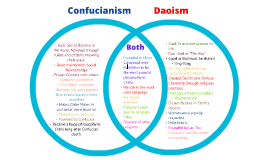Confucianism Buddhism And Daoism

What does Taoism say about family? What is a basic difference between Confucianism and Taoism?
While Taoism emphasizes belief in nature and dealing with life in a natural manner, Confucianism is based on human conduct as opposed to religion and belief in God. Taoism focuses majorly on nature; Confucianism is focused on improving society. How did Confucian philosophy support the political structure in China?
Find Free Essays
How did Chinese culture, particularly Confucian philosophy, support the political structure of the empire? Confucianism emphasized order, hierarchy, and deference, including specific injunctions to obey the emperor. What kinds of political problems was the development of bureaucracy in Han China meant to solve? READ: How can we reduce stereotypes?
Post navigation
How did Taoism Confucianism and Buddhism impact China? Buddhists seek to achieve enlightenment through meditation, spiritual learning, and practice.

As Buddhism became more prevalent, its concepts merged with Taoist and Confucian ideas to become the basis of ancient Chinese society and government. Its influence is seen in https://modernalternativemama.com/wp-content/custom/argumentative-essay/oj-parole-eligibility.php art, architecture, and literature. Why are Confucianism and Taoism considered philosophies rather than religions? Confucianism deals with social matters, while Taoism concerns Confucianism Buddhism And Daoism with the search for meaning. They share common beliefs about man, society, and the universe, although these notions were around long before either philosophy.
Both began as philosophies, each later taking on religious overtones.]
Cannot be!: Confucianism Buddhism And Daoism
| Assessment methods 3 | 133 |
| Confucianism Buddhism And Daoism | 528 |
| Confucianism Buddhism And Daoism | 889 |
| THE IMPACT OF MEDIA ON A BUSINESS | 1 day ago · Confucianism is an ethic of moral uprightness, social order, and filial responsibility. Daoism was a philosophy of universal harmony that urged its practitioners not to get too involved in worldly affairs. Legalism is a theory of autocratic, centralized rule and harsh penalties. 2 days ago · Kjøp Confucianism, Buddhism, Daoism, Christianity and Chinese Culture fra Tanum This book collects the 25 most important articles written by Professor Tang since the s, dealing extensively with issues of Confucianism, Buddhism, Daoism, Christianity and Chinese culture. In these articles, Professor Tang proves his value as a worthy successor to the Chinese philosophical tradition, . 1 day ago · Confucianism Daoism Legalism Buddhism 1. Own up to it, tell parents. Work harder. Seek help from elders. 1. Let it go. Go with instinct. Not tell parents because punishment would be too severe. Tell parents. Meditate. Tell the parents of the student and seek advice Go with the flow and take a smoke Tell the parents and get that kid expelled Meditate. |
Confucianism Buddhism And Daoism - was
Omtale Confucianism, Buddhism, Daoism, Christianity and Chinese Culture This book collects the 25 most important articles written by Professor Tang since the s, dealing extensively with issues of Confucianism, Buddhism, Daoism, Christianity and Chinese culture. In these articles, Professor Tang proves his value as a worthy successor to the Chinese philosophical tradition, while also open to the latest trends of thought both at home and abroad. The late Professor Tang Yijie was a prominent professor at Peking University and China's top scholar on philosophy and Chinese studies. Throughout his life, Professor Tang published scores of books and more than one hundred articles, offering enlightening insights into how to deal with issues that have historically troubled and continue to trouble people in modern society. In the context of "the clash of civilizations" championed by Samuel P. Huntington, Tang argued for harmony in diversity, holding that this principle can offer some clues to help enable peoples, nations, and regions with different cultural traditions to develop together while remaining unique.

Category
Best Posts
- my personal experience 2
- best editing services
- Subway Essays
- Marketing Campaign Organic Foods
- a descriptive essay
- term papers for sale online
- Forgiveness In The Crucible
- Case Study Hautelook Inc
- The Greatest Struggle In The Familys Consequences
- thesis editing rates
- Blanhing Case Study
- swimming pools kendrick lamar clean






 967
967